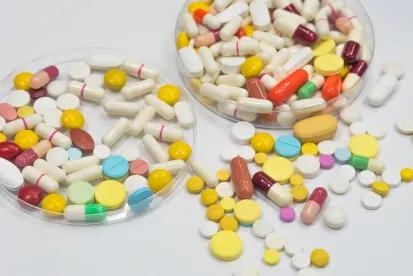Summary
A massive bill intended to address the nation’s opioid crisis is about to become law—the House overwhelmingly voted in favor of the SUPPORT for Patients and Communities Act (H.R. 6) on Friday, September 28, 2018, and the Senate followed suit on Wednesday, October 3, 2018; President Trump has voiced support and is expected to sign the measure. Of the many consequential provisions in the more than 600-page bill, one that could have a significant impact on those involved in recovery and treatment efforts appears to have garnered little attention to date. Section 8122 of the bill (Recovery Kickback Prohibition) would make it a federal crime to pay for referrals to recovery homes, clinical treatment facilities and laboratories. Violations would be punishable with criminal penalties, including monetary fines, imprisonment, or both.
In Depth
The Background
Congress has shown a growing concern about patient brokering in connection with substance use disorder treatment centers. In a July 13, 2017 letter, a bi-partisan group of chair and ranking members of the House Committee on Energy and Commerce and certain subcommittees wrote to the Secretary of the US Department of Health and Human Services (HHS) raising several questions about the topic. One question, in particular, stands out: “Are there adequate anti-kickback protections that would make [patient] brokering a violation of federal law?” While some state laws, such as those in Florida, Massachusetts and Texas, may reach some patient brokering conduct, HHS’s response to the July letter made clear that there are limits to the reach of existing federal law. In a September 12, 2017 response letter, HHS stated that “[t]o date, abusive payment arrangements involving opioid addiction treatment centers primarily have affected private health insurance plans . . . . The [federal anti-kickback statute, 42 U.S.C. 1320a-7b(b) (Federal AKS)] applies only to federal health care programs; it does not apply to privately insured patients.” The 2017 exchange between Congress and HHS focused on patient brokering connected to treatment centers, but concerns have also arisen about perceived overutilization of laboratory-based toxicology screening. The Recovery Kickback Prohibition appears to be Congress’ attempt to close the gap left by the Federal AKS and to reach certain patient brokering arrangements, including those involving laboratories, that fall outside its scope.
The Prohibition
Section 8122 of the SUPPORT for Patients and Communities Act sets forth the referral prohibition as follows:
a) OFFENSE.—Except as provided in subsection (b)[, which establishes certain exceptions to the prohibition], whoever, with respect to services covered by a health care benefit program, in or affecting interstate or foreign commerce, knowingly and willfully—
(1) solicits or receives any remuneration (including any kickback, bribe, or rebate) directly or indirectly, overtly or covertly, in cash or in kind, in return for referring a patient or patronage to a recovery home, clinical treatment facility, or laboratory; or
(2) pays or offers any remuneration (including any kickback, bribe, or rebate) directly or indirectly, overtly or covertly, in cash or in kind—
(A) to induce a referral of an individual to a recovery home, clinical treatment facility, or laboratory; or
(B) in exchange for an individual using the services of that recovery home, clinical treatment facility, or laboratory,
shall be fined not more than $200,000, imprisoned not more than 10 years, or both, for each occurrence.
The Federal AKS makes it a crime to knowingly and willfully provide anything of value in return for or to induce or reward referrals of federal health care program business. Rather than amend the Federal AKS, Section 8122 of the SUPPORT for Patients and Communities Act would create a new, separate prohibition in Title 18 of the US Code. There are some similarities between the Federal AKS and the new Recovery Kickback Prohibition. For example, both laws make it a crime to offer, pay, solicit, or receive “remuneration (including any kickback, bribe, or rebate)” in connection with referrals. Historically, in the context of the Federal AKS and various other health care fraud and abuse laws, the federal government has interpreted the term “remuneration” broadly to cover “anything of value.”
There are also some important distinctions between the laws. As noted in HHS’s September 12, 2017 response letter, the Federal AKS applies to only federal health care programs and does not apply to privately insured patients. Unlike the Federal AKS, the Recovery Kickback Prohibition would apply broadly to any health care benefit program, which is defined as “any public or private plan or contract, affecting commerce, under which any medical benefit, item, or service is provided to any individual, and includes any individual or entity who is providing a medical benefit, item, or service for which payment may be made under the plan or contract.” Of note, however, the Recovery Kickback Prohibition does not preempt the Federal AKS or relevant state laws. Specifically, the statutory language states that the Recovery Kickback Prohibition does not “apply to conduct that is prohibited under [42 U.S.C. § 1320a-7b, which includes the Federal AKS]” and is not to be construed to “occupy the field in which any provisions of [the Recovery Kickback Prohibition] operate to the exclusion of State laws on the same subject matter.” So as a practical matter, for example, the Recover Kickback Prohibition could not be used when the Federal AKS otherwise applies (i.e., in situations involving items and services reimbursable by federal health care programs). Additionally, the Recovery Kickback Prohibition applies only to referrals and services of certain types of entities, namely recovery homes, clinical treatment facilities, and laboratories as defined in the statute. In this way, the Recovery Kickback Prohibition is narrower than the Federal AKS.
The Exceptions
The Recovery Kickback Prohibition includes certain exceptions. Many of the exceptions mirror or directly reference exceptions or safe harbors under the Federal AKS, and include the following:
1. Certain properly disclosed discounts under a health care benefit program;
2. Certain payments to bona fide employees and independent contractors;
3. Discounts on drugs furnished under the Medicare coverage gap discount program;
4. Payments for services that meet the Federal AKS safe harbor for personal services and management contracts;
5. Certain coinsurance and copayment waivers and discounts;
6. Certain federally qualified health center arrangements that meet the Federal AKS exception; and
7. Remuneration made pursuant to alternative payment models and certain payment arrangements that the Secretary of HHS determines to be necessary for care coordination or value-based care.
Each exception contains specific criteria that must be met in order to be excluded from the reach of the Recovery Kickback Prohibition. Additionally, the Recovery Kickback Prohibition grants the Attorney General, in consultation with the Secretary of HHS, the authority to except “any other payment, remuneration, discount or reduction” by regulation and to issue regulations that clarify the statutory exceptions.
Interestingly, the exception for bona fide employees and independent contractors is an instance in which the Recovery Kickback Prohibition differs from the Federal AKS in a material way. The Federal AKS exception for bona fide employees is quite broad, protecting any payment for furnishing covered items or services. In contrast, the Federal AKS personal services and management contracts safe harbor, which applies to independent contractors, is narrowly drawn in requiring that the aggregate payment over the term be set in advance, effectively making an hourly or other event-based payment outside of the safe harbor. In the Recovery Kickback Prohibition exception for payments to bona fide employees and independent contractors, Congress created more specific and restrictive requirements around the types of payments that may be made. Here, payments cannot be determined by or vary by the number of individuals referred, the number of tests or procedures performed, or the amount billed to or received from the health care benefit program of the referred individual.
Analysis
Historically, federal anti-kickback enforcement efforts have been limited to conduct involving federal health care program beneficiaries, like those who receive Medicare or Medicaid. The Recovery Kickback Prohibition materially changes the landscape by extending a criminal prohibition to certain drug treatment providers that previously may not have needed to structure their business around the Federal AKS because they did not receive federal health care program payments. This new prohibition creates a number of questions for affected providers and their business partners. The statute contains broad, yet undefined, exceptions. It is not clear whether the body of guidance created by OIG will be used by DOJ to interpret the Recovery Kickback Prohibition or whether DOJ will interpret this statute differently. For example, in the 1991 preamble OIG described marketing as a “technical” violation, but since developed an analytical framework for evaluating non-safe-harbored marketing activities through various advisory opinions and other guidance. How DOJ will apply the Recovery Kickback Prohibition is an open question.
Conclusion:
The Recovery Kickback Prohibition in the SUPPORT for Patients and Communities Act appears to be Congress’ attempt to fill a gap left by the Federal AKS in connection with patient brokering activities associated with treatment and recovery efforts. It provides the federal government with another tool intended to address issues related to the national opioid crisis. The impact of the law, particularly on those who operate in the treatment and recovery space, remains to be determined. If you are involved in one of the types of entities covered by the Recovery Kickback Provision, you should evaluate whether you are able to structure any arrangements that might implicate the law to meet one of the exceptions and ensure that you update your compliance plans to account for this new compliance risk.




 />i
/>i

